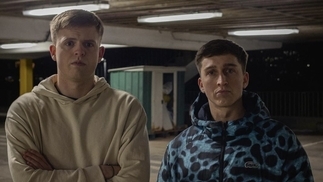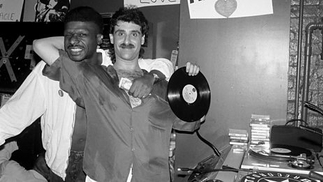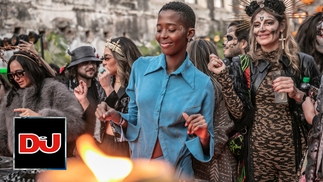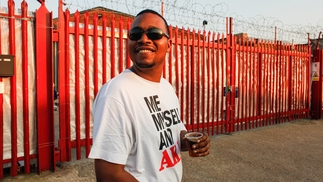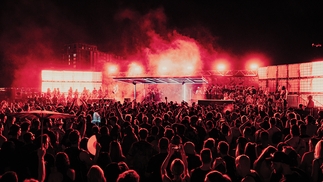The Black Madonna: DJ Mag UK cover feature
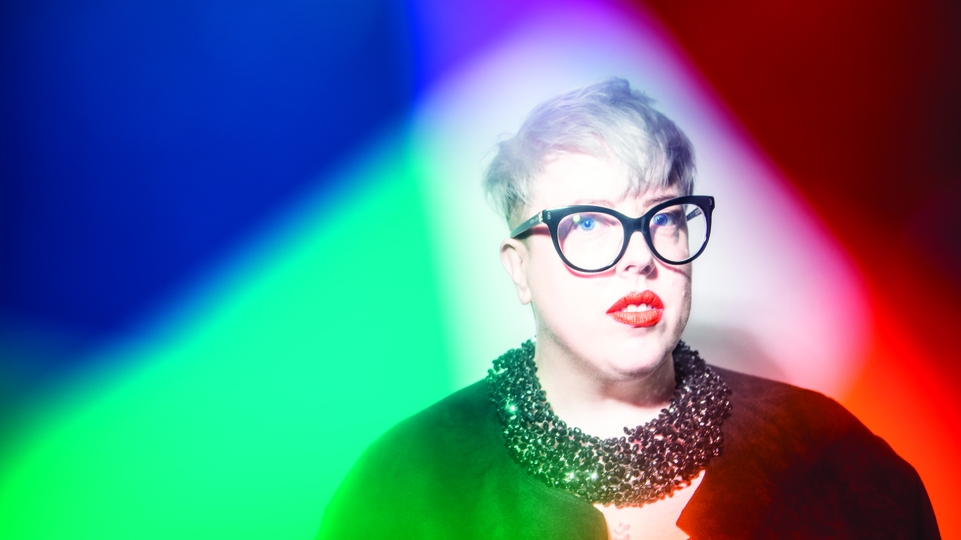
The Black Madonna is the real deal. Raised in Kentucky but born in the DJ booth of Chicago's Smartbar, she's unleashed the true spirit of house back into the world. Fearlessly challenging the status quo both on and off the dancefloor, she’s spearheading a global revolution drawing its power from the founding principles of dance culture. In advance of playing our Miami pool party, we found out why The Black Madonna still believes...
It’s a Sunday in 2015 on the third day of UK festival Field Maneuvers, a back to basics ‘dirty little rave’ held in a eld just outside of London. Having wrapped up an afternoon where the main stage has been moved outside into the blazing sunshine, the action is shifting back under canvas, where The Black Madonna is set to warm up for Panorama Bar resident Nick Höppner and Glaswegian heroes Optimo. It’s only been two years since she played her first gig outside of America, riding on a reputation as the booker and resident DJ at Chicago’s iconic Smartbar, and she’s still nervous about how to proceed, jaded final night ravers slow to bid farewell to the September sun’s last gasp of summer and come inside.
Then she starts. Her set begins with slow irresistible funk, the sound she started DJing on college radio while studying music in her native Kentucky around the turn of the Millennium. The cosmic rush of Rah Band’s ‘Messages From The Stars’ adds an electronic edge, and the tent begins to surge. Then in slides Wham’s ‘Everything She Wants’, washing away all the emotional grime and fatigue of the last 48 hours. Emboldened, she switches gear for take off, Mia Dora’s acid-bubbling ‘Un.Sub’ paving the way for a finale of raw jacking house. It’s gloriously uplifting, educating and over owing with fun: in short, everything her reputation promised.
By now, almost everyone has their first defining memory of hearing The Black Madonna, aka Marea Stamper, play. From Dekmantel and Parklife to closing Sonar, she’s a festival fixture. Last year, London club XOYO booked her We Still Believe party, which shares its name with her label, for a 13-week run as part of its resident series. Yet it’s not only this behind-the-decks ubiquity that has marked her out. Finding her own teenage sanctuary from bullying in the Midwest’s ’90s rave scene, she’s become a force seeking to correct what has gone awry in electronic music since its idealistic beginnings, from addressing the huge gender inequality and issue of safety in clubland, to platforming the marginalised voices without whom house music wouldn’t exist.
It makes her a DJ for our turbulent times. When we meet in a North London coffee shop, it’s the day after Donald Trump’s self-aggrandising State Of The Nation address, a field day for fact-checkers, and the morning that the BBC announces its female employees aren’t underpaid, reasoning that their six per cent pay gap is less than the national 18 per cent gap. It’s this cold world that raves once provided an alternative to, temporary autonomous zones where mantras such as ‘peace, love, unity, respect’ were straight-faced ideals, rather than empty marketing slogans at giant commercial festivals. Much has changed since then, however.
“I believed that our culture, at least in theory, held certain values to be essential to its operation,” says Marea on the bedrock attitude fostered in her formative years selling mixtapes at raves around America (see box out, right). Clad head to foot in black, an ‘I Feel Like Pablo’ logo gives away her appreciation of Kanye West, just one of many curveballs that illustrate her love for unpredictability. “Even if we failed, even if we shot at a target and missed it over and over again, which of course we did.”
Somewhere along the line it seems that much of the dance music community stopped aiming at all. “There’s a guy who threw one of the most seminal American raves I know, who turned out to be a Trump supporter,” she says, with a mix of bemusement and disbelief when we come to the inevitable subject of America’s current president. “Trump’s given a lot of people the permission they felt that they needed to say a lot of stuff that they’re feeling inside.”
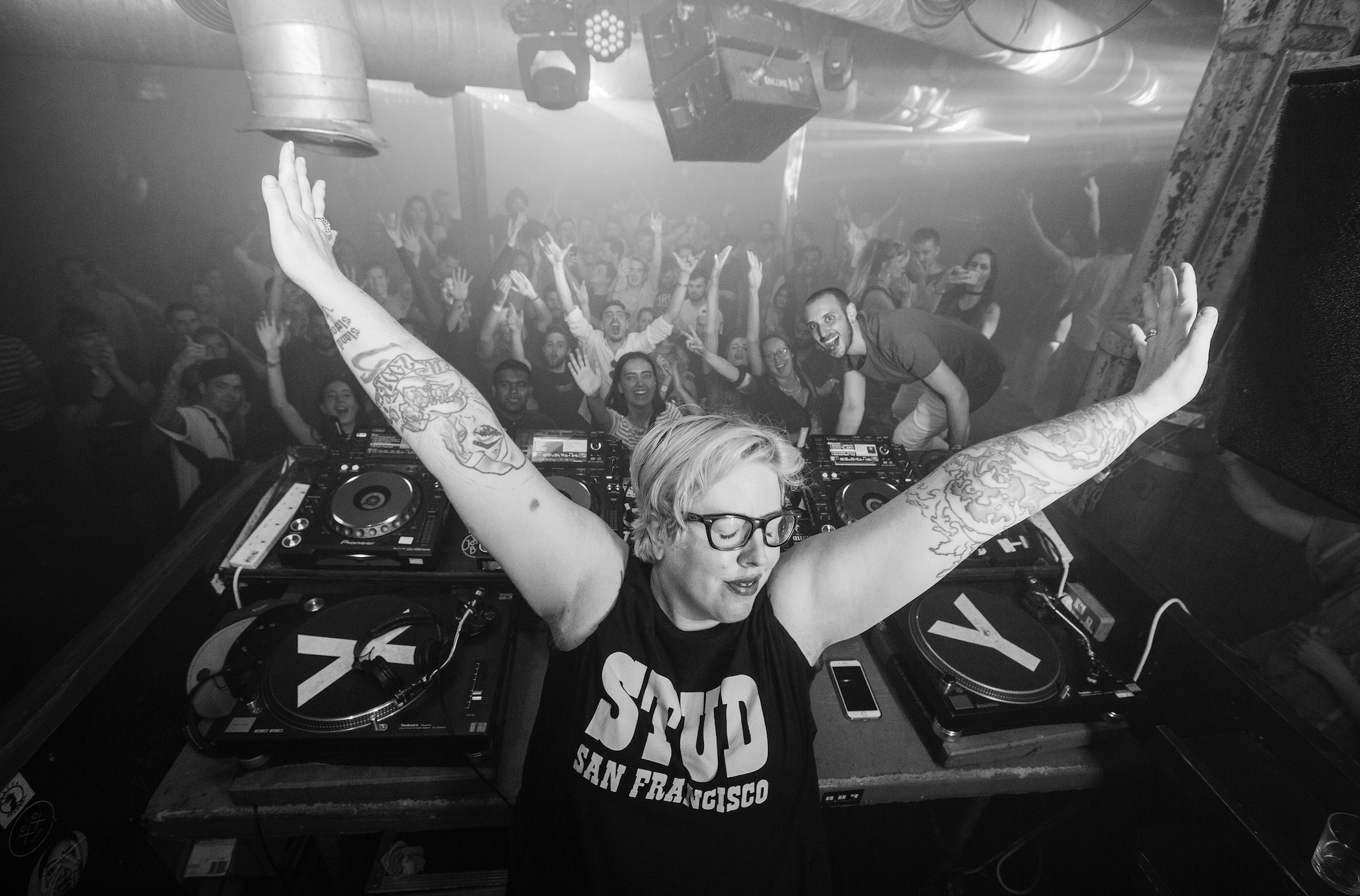
VALUES
If this has locked the world at large into a battle for hearts and minds, it’s also sparked conversations within the dance music community about where its founding values have gone.
“There was a point years ago when things I, and other women said, about club culture being a misogynist space were taken as controversial or debatable,” she says. As #MeToo has encompassed women in dance music telling of the abuse that they’ve suffered as well, its self-evidence has become clear, from male — and largely straight, white — dominated line-ups to the thousands of tracks on YouTube represented by pictures of women in bikinis. “‘I’m shocked when men say they’re shocked,” she goes on, incredulously. “Did you ever talk to a woman?” It’s a situation, she says, she’s heard Oscar-nominated director of Get Out, Jordan Peel, compare to that of black people. “If you are marginalised, you’re told that your experiences can’t be trusted, that you’re not a reliable narrator of your own truth.”
It’s an atmosphere where change is beginning to happen, albeit alternating between mob rule and the slow crawl out of inertia. The online demolition of Ten Walls and Konstantin for their repugnant views hasn’t provided any quick x, she believes, nor necessarily even stopped their bookings. “It’s the one sacrificial lamb that people can point to,” reasons Marea, explaining that she’s not down with the idea of ‘policing’ dance music. “In the most part, people make their apology and go on and it’s fine.” Those few men who are censured, she points out, receive more attention than the hundreds of unnamed women forced out of dance music by sexual harassment. “It’s the cost of doing business for being a woman on planet Earth in 2018, and no-one cares.”
If this systematic failure isn’t going to change overnight, then there’s no doubt that The Black Madonna has played a huge part in launching a wave of positive action to redress the balance, throwing women in, as she puts it, rather than throwing men out. “Where I do see change is that people are stepping up,” she points out, name-checking the unlikely ally of Steve Aoki as someone now speaking out on the unbalance of line-ups. So what, she adds pragmatically, if this process involves a turnaround from what some DJs or labels have said or done in the past. “If we don’t allow people to change, we’re going to have to wait for babies to grow up. “People want to feel that there is some role that they can play in the creation of a better space,” she says, pinpointing an issue currently at the heart of clubland. “If neither hope nor fear serve us right now, the middle path is belief. I don’t want to have hopes that are unrealistic and I don’t want to be afraid of the boogie man, but I do believe that change is possible, and that I and the people around me can be the architects of it. It’s something I believe at a personal level, it’s something I believe at a political level, it’s something I believe at a creative level. Dance music culture looks and behaves however we imagine it to be. The past is the past, and often the good old days were the bad old days for many other people.”

BETTER WORLD
It’s here that her spirit and party, We Still Believe, has captured the attention of those who refuse to capitulate to fear-driven division, who are unwilling to sit around in the vain hope that things will get better on their own. “I want to make the event look the way I wish the world did, so it has amazing sound, it has the best DJs in the world and it has line-ups that are super-mixed and crowds that are incredibly diverse,” she explains. “I want to put money in the pockets of DJs who might not otherwise get it, I want to hire dancers and pay them well and I want to have really good security who are trained to make everyone feel comfortable. Rather than raging against the dying of the light, we’re actively constructing a new world, which is hopefully a bit better and kinder and funkier than the one that we were in before.”
In 2016, it provided the banner for her first ever US tour, where she was joined by a wave of American DJs who’d also been keeping the original spirit of house and techno alive in dispersed pockets around the country, including Jason Kendig from San Francisco’s Honey Soundsystem, Honey Dijon and DJ Heather, both also Smartbar residents in Chicago, and Mike Servito from Detroit. The latter shares her Midwest rave-going background, but despite attending the same parties and having the same friends for 20 years, they’d still never met when Servito first saw her play for a warm-up party for Movement in 2012. With the headliner arriving late, Marea, then just recruited as the new assistant for Smartbar and not yet resident, found herself elevated to her rst headline gig in front of a large audience. “It was one of those moments you could feel something was changing,” she recalls. “The party was so full and I was really afraid. I was out on the patio and I was like, ‘I’m going for it and playing like I’m supposed to be the headliner’. Mike’s told me he walked in and was like, ‘Who is this bitch, who does she think she is?’”
A few minutes into hearing her though, his tone changed to, “‘Wait a minute, who is she?’” Now close friends, it was an invitation to play Oakland’s As You Like It Party in 2016, preserved as a now-famous rattling four-and-a-half-hours podcast, that began a back-to-back relationship which has also seen them perform for Boiler Room at Dekmantel. “He was like, ‘OK, we keep it cute, jacky, freaky, funky house, you know?’” chuckles Marea on the text he sent her before their first appearance together, the only discussion they had of what to play.
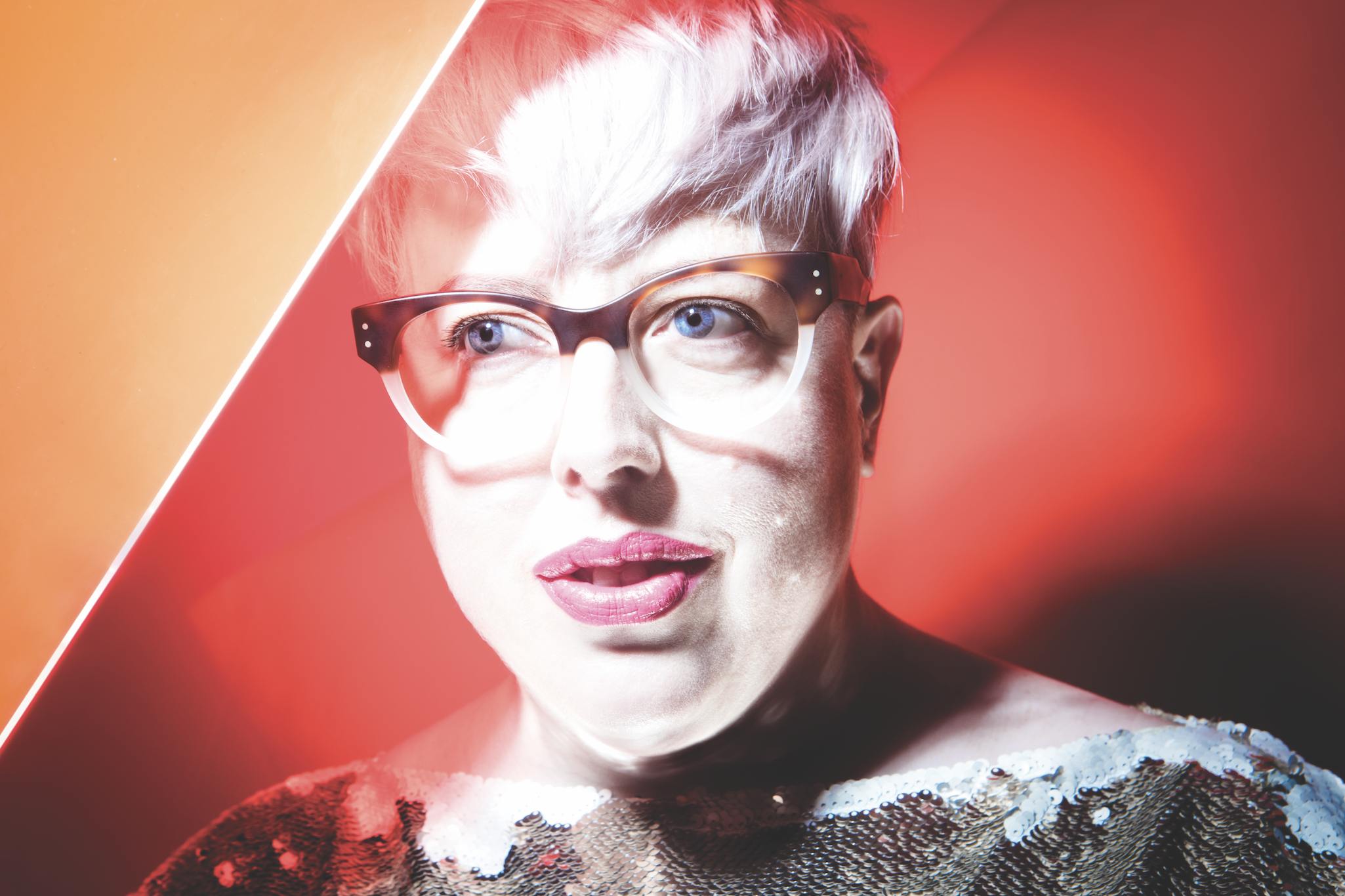
WILD SCENES
Her XOYO appearances welcomed a similarly wide range of selectors, from Shanti Celeste, Heidi, K-Hand and Peggy Gou to Midland, Derrick May, Rahaan and Gilles Peterson, while three nights of the run bore witness to the huge scope of her musical history, covering EBM and industrial, breakbeat and rave, and disco and house. Since then, We Still Believe has set off to bring its energy across Europe. At the end of last year, the grade II-listed boxing venue York Hall played host to a reprise in London where she was joined by Dan Beaumont, the co-founder of Dalston Superstore and gay rave Chapter Ten, who also gave The Black Madonna her first London gig at Dance Tunnel in 2015 (“He was phenomenal, I fell in love with him right then,” she admits). Joined by performers from London’s drag scene, like Sink The Pink dancer and trans icon Lucy Fizz, dancing inside a boxing ring, it united the local scene around her rallying call, and this year she’s already brought similarly wild scenes to Paris and Amsterdam.
The extended cast of players — dancers, vocalists, DJs and friends — gives We Still Believe its potency, but none of it would exist without Marea’s steely core of self-belief. If she sometimes sounds like a politician in her ability to distil exactly the right words to stir up emotions, it’s because her dad was a speechwriter. “We’re hardcore yellow dog Democrats,” she jokes at one point, meaning that even if the party ran a yellow dog, they’d vote for it. Her grandmother, meanwhile, collects donkeys, the somewhat unlikely symbol of the party, although an animal whose famed obstinacy she seems to have inherited. Politics is a career you can imagine her following one day, such is the measured, convincing and deeply considered way that she expresses herself. Having already had an ex-actor and ex-reality TV star as president, the world’s rst ex-DJ no longer seems so unlikely. Throw in Labour Party remainer and UK garage-head Chuka Umunna as Prime Minister and parties really will have got political.
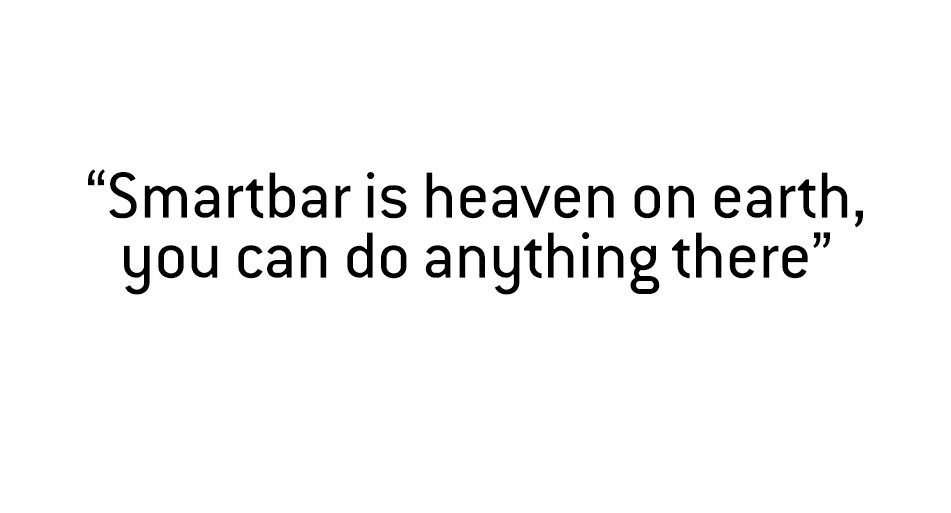
TWO CITIES
It’s Chicago, though — not Washington — which has set her on her current course of social change. Now forty, The Black Madonna’s success in Europe seemed almost overnight: “It sounds like a real cliché, but it was a moment I knew my entire life had changed forever,” she says, after playing Panorama Bar on her rst trip out of the States in 2013, Kerri Chandler coming to thank her at the end of her set. But it almost never happened at all. She began DJing in 1998 and moved to Chicago in 2006, invited by Radoslaw Hawryszczuk, one of the connections from her mixtape days, to help out with his label Dust Traxx. “It was October 28,” she appends to the year, “I don’t know why I remember that.”
In retrospect, the significance of this upheaval from the polite, rural surroundings of Kentucky to the dog eat hotdog streets of Chicago is clear, but the transition proved tough. Pre-The Black Madonna moniker or her disco-centric core (early productions from this time reflecting the minimal house era), she’d all but given up the dream and was writing copy about women’s underwear, when she got a call in 2012 to come and work at Smartbar, Joe Shanahan’s iconic home of house and the oldest dance club in the world.
“Smartbar is heaven on earth, you can do anything there,” she says, direct and to the point, describing it as a unique place in the American club scene. Still a resident there, playing around six times a year, she even maintains the job title of Musical Director after having to hand on her role as talent buyer. “I’m more a spiritual advisor,” she chuckles at the reality. “I don’t do anything.” When she began, however, it was doing everything, working as assistant to her predecessor Nate Seider. “It was a job a 20-year-old took, not a 35-year- old woman,” she says, underlining how keen she was to take up the opportunity, working various other jobs alongside it to make it work.
“From the day it opened, the point of the club has been to nd and support emerging talent,” she says on the over-riding remit of the club’s near four-decade history. “It’s the only place in the world where someone like me would have been given the chance I was, off the bat.”
It was no easy ride when she replaced Seider in 2013, though. “In Chicago, you can think you’re King Shit of Turd Mountain, but you’ve got to go on after Derrick Carter or Honey Dijon or DJ Heather,” she explains on the city’s ercely competitive spirit, telling us that she’s heard Smartbar residents boo one another, good naturedly, at least a dozen times. Get heard making a loose transition and you’re met with intimidating cries of “Hot Mix, coming in hot, is it hot in here?”
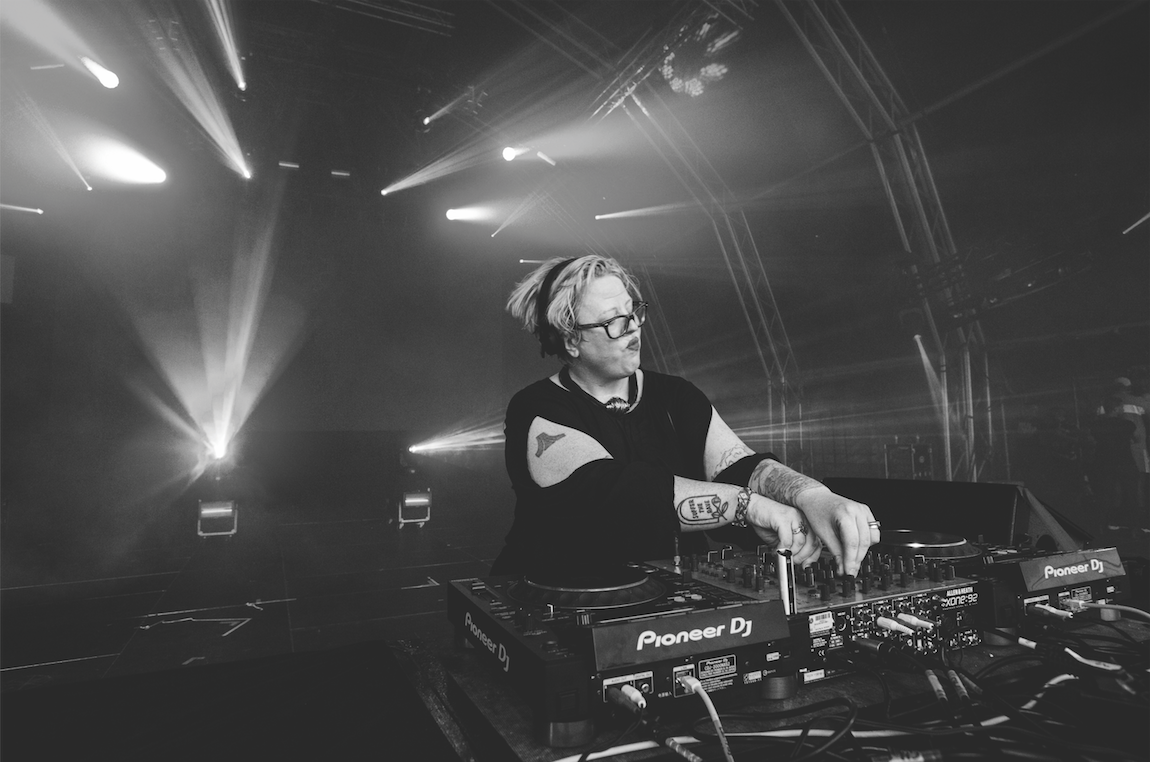
To be good, you’ve got to be the best. “Chicago is a city of heavyweights, and nothing is given,” she acknowledges on how she got fighting fit to take on the world, adding how it’s a running joke how surprised the world is when a long- standing Chicago DJ goes abroad for the rst time. “It’s its own ecosystem.”
Part of this is an education in the genuine roots of house. “There’s a great Blaze line, ‘I remember house before it was house’,” she says when discussing how a recent mix connects the Northern England synth-pop of Vicious Pink, the Italo disco of N.O.I.A, Australian rockers INXS and the New York electro of Newcleus. “There was a moment house became self-aware,” she points out, “but it existed before that in the collision of Italo disco and industrial and Philadelphia disco and Chicago soul records and ’80s electric funk, things like Imagination.”
Clark Street, where Smartbar is situated, may have Gramophone, one of the oldest dance record shops in the world, just a stone’s throw away, but it also has Wax Trax, the shop whose label made stars of Ministry and licensed Belgian group Front 242, “one of the most important groups in the history of Chicago dance music, for sure”.
It’s a phenomenon illustrated each year by Chosen Few, an old school picnic reunion that attracts the kind of crowd who remember these early years. “Watching this crowd that is black, Hispanic, 40 or 50-years-old, mixed between gay and straight, singing all the words to a Gino Soccio song, that’s house music,” she says, as much as hearing any of its more codified classics. It’s these experiences at Smartbar, a distillation of Chicago heritage, which have sometimes made her journey out into the world feel a little bizarre. “It’s very interesting leaving the Smartbar nucleus and seeing what’s unusual in other places,” she says circumspectly, which in general boils down to “the willingness to play popular music, rap, or something in the middle of a house set”.
When we meet, it’s before Kylie has been announced to play at Panorama Bar, a no doubt sincere booking that has had the added bonus of riling up homophobic techno bros, but she tells a similar story of how Derrick Carter received a wave of online complaints after dropping a Rihanna acapella there from purists holding onto an ideal that never existed. “It’s 99% positive when I play Cardi B,” she adds on the outspoken stripper-turned-rapper she’s billed alongside at this year’s Coachella. “Then there’ll be one guy looking down his nose because he wanted me to play something without words.”
If Chicago made her, it’s London that’s become her new home, living with her husband (who she met around the same time that she started at Smartbar) in East London. It’s a domestic situation she describes as having “utterly reversed gender roles”. While she was playing up to five gigs a week last year, so many in fact that her mother started going to church and praying for her, he was making her healthy bento boxes to take on tour, displaying the cuteness of their relationship via occasional cheeky snaps of his exhausted, passed out wife — much to her annoyance. He even accompanied her to a gig at Snax, Berghain’s infamous sex party, joined by a friend with the pair of them wearing the football strip of his native Ukraine, Derrick Carter acting as security. “A fine time was had by all,” she confirms, slyly.
Initially confused by the city’s roads, “like a plate of spaghetti that’s been dropped on the ground”, it’s proved something of a homecoming, Marea’s family actually descended from English, Irish and Scottish immigrants. Kentucky shares London’s culture of politeness, combined with vicious but good natured piss-taking, and the British gene of talking about the weather has been activated on entry.
“It doesn’t get too hot... or too cold... ever,” she says on the revelation she had one day on Broadway Market. “Chicago is so brutally cold, then it gets scorching hot. You don’t have that though, I wouldn’t even call it weather.” There’s plenty more about London that chimes with the ethos of We Still Believe: the genuine multiculturalism, the way that you can walk down the road and hear a car blaring jungle, the fact that “popular underground dance culture”, a terms she acknowledges is a contraction in terms, is alive and well. There’s no American equivalent of Radio 1, for example, she mourns, having just started a residency on the BBC’s agship station.
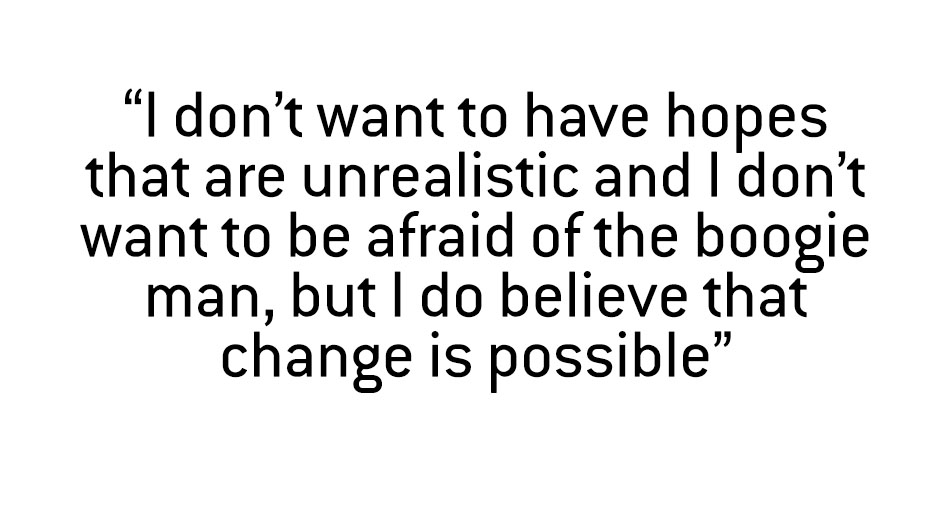
DISCO
Alongside all this, her own musical output has matured at an exponential rate, taking fans from ‘Alright This Morning’, her steadfastly optimistic Johnny Hammond- sampling 2012 debut to last year’s ‘He Is The Voice I Hear’, a sumptuously arranged live disco epic packed with layers of complexity. With her studio still in Chicago, any breaks in touring have been spent working on what will become an album, a band of 10 or so people involved, including vocalists Jamie Principle and Shaun J Wright, and Bob Weston, bassist from Steve Albini’s rock band Shellac. “Jamie is a phenomenal person,” shares Marea, on the voice behind hits from the Frankie Knuckles-composed ‘Your Love’ to ‘LaLaLaLa’ by Green Velvet: “He’s having a second, or third, or fourth, or fifth life.” It’s an expansive project, with her playing most of the instruments, writing all the lyrics and doing all the arrangement.
With neither her nor Shaun reading sheet music, the process has involved various workarounds, such as her singing into a small microphone in his ear, then him translating this into his own voice. “I’ve very much wanted to step past the traditional expendability of certain kinds of dance record, and into that more permanent canon,” she says when we talk about what makes disco so timeless, an emotional core rendered through universal lyrics and live playing. “That’s a real hope for me with this. So far, so good — it’s exceeded my expectations.”
Since accepting a Smartbar job that some might have written her off for, this is where all expectations seem to be ending up. “The shows are sometimes selling out in days or hours, even,” she says, still with a sense of slight surprise at the momentum the movement she’s started is gaining.
It’s not just about personal freedom, about the right to a safe space to be who you are, but also about the experience of musical freedom. “You can have Wham!, you can also have industrial, you can have an hour of jungle. You can have all of those things and nd a connection, not just between different kinds of people, but also different kinds of music and different places in the history of dance music. “The story that we’re telling is not just what is happening at this very moment, but what ties our past, present and future together,” she continues. “I think it adds a sense of gravity and places what we’re doing outside of trends. This party will be as fresh in five years as it is today, because it doesn’t exist at a point on the calendar and there will always be room for a surprise ending. Now that I know people will go along with whatever insane idea we throw at them, I want to challenge them more.”
It’s an amorphous antidote to the litany of problems facing clubland today: parties filled with DJs playing identikit tunes, the commodification of culture away from those who created it, a lack of safety for anyone not tting a narrow demographic. Like the icon she takes her name from, a pilgrimage to hear The Black Madonna promises an experience that transcends this. Join her at one of her parties and start to believe too.
•The Black Madonna plays DJ Mag’s pool party at the Surfcomber on Wednesday 21st March.

